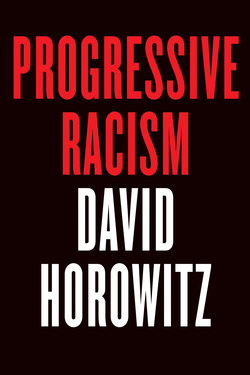Читать книгу Progressive Racism - David Horowitz - Страница 14
На сайте Литреса книга снята с продажи.
Оглавление5
A Washer Woman Shall Lead Them
As someone who helped to create the radical New Left in the ’60s and became a conservative in the ’80s, I am often asked to explain how it is possible to make such a 180-degree turn. I have tried to answer this in a 450-page autobiography.11 But there is a short answer as well. I abandoned the agendas of the left because they do not work. Socialism, big government and economic redistribution have proven disastrous to the very people whom the left proposes to “liberate.”
David Horowitz, Radical Son: A Generational Odyssey, Free Press, 1997.
I still believe in the “liberation” of blacks, minorities and the poor, as I did in the 1960s. Only now I believe in their liberation from the chains of “liberalism” and the welfare state—from permanent dependence on government handouts, from perverse incentives to bear children out of wedlock, from inverted ethics that imply it is better to receive than to give, and worse, to receive without reciprocity or responsibility and above all without work. The doctrines of the left teach those who have fallen behind in the economic scramble to blame others for their failure. This attitude stimulates resentment and deprives its holders of the power to change their condition. The left insists on race preferences, thus delivering the message to minorities that they cannot compete unless the system is rigged in their favor. This reinforces the sense of group inferiority, which is the essence of racism.
Leftist doctrine proposes double standards of intellectual, moral and professional competence, teaching minorities that they can get away with less. It is a crippling philosophy for those it claims to help, and a not-so-subtle expression of racial arrogance on the part of those are behind it. Under “liberalism” no one is responsible. Instead, something called “society” is the root of all evil. If a criminal strikes a prey, “society” is the root cause of his wickedness; if a person is poor, “society” has made him so. If conservatives seek to hold people responsible for their condition, it is out of a mean-spirited impulse to blame the victims. How could there possibly be all this opportunity conservatives talk about when America is saturated with racism and oppression?
I used to believe all this nonsense, but then I arrived at a worldview based on what I have recently come to call the Oseola McCarty principle. Oseola McCarty is a 75-year-old African-American cleaning woman from Mississippi. From her working life she was able to accumulate enough savings to donate $150,000 to a student scholarship program at the University of Southern Mississippi. In short, a black woman living in the most racist and poorest state in the union (almost half her life under segregation) could earn enough money washing other people’s clothes to save $150,000 and give it away. If Oseola McCarty can do that, what American black or white cannot?
Oseola McCarty’s example tells us that the poverty problem in America is not about lack of opportunity or jobs, or about racism. Poverty is about individual failure. It is about family dysfunction, character disorder and self-destructive behavior. That is what Oseola McCarty’s achievement means. It is no surprise that, while most self-appointed spokesmen get tongue-tied when asked if African-Americans have gained anything from the civil rights revolution of the last 30 years, Oseola McCarty has no hesitation. She says the world is a “much, much better place” than when she was a child. So it can be for anyone liberated from the philosophy of the left. The new mantra would be this: Spare us from the kindness of those who would cripple us with excuses for attitudes and behaviors that can only hold us back and eventually destroy us. Keep us from the charity of those who would chain us to their benevolence with lifetime handouts. Spare us the compassion of saviors who secretly despise us, who think that we cannot compete on our merits or live up to the moral standards they expect of themselves.
This is the creed of true equality. It has just taken me a long time to understand that.
March 31, 1997, http://www.salon.com/1997/03/31/horowitz970331/ http://www.newsrealblog.com/2011/01/21/an-old-black-washer-woman-shall-lead-them/print/.
1 David Horowitz, Radical Son: A Generational Odyssey, Free Press, 1997.
